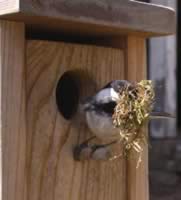Question: When will nest building start?

Short Answer: When the birds are ready.
Long Answer: It probably depends on whether they are resident or migrant, age, availability of a mate, time of year, temperatures, food supply and nest site availability. Sometimes we are anxious to get that first egg, but if eggs are laid too soon during cold weather, they may not hatch.
- First, birds must be in the area. Resident birds tend to start nest building earlier, especially if they are returning to a box they used the previous year. Migrants show up later, and thus may start building later.
- Older/more experienced birds may start building earlier than first year birds.
- Birds will not start a nest until they have a mate. Nest site selection is usually a joint effort. In the case of bluebirds, the male shows off potential spots, and the female makes the final selection.
- Day length affects hormone production, which stimulates mating and egg production.
- We can surmise that birds either “know,” or their physiology adjusts to food availability before they begin to produce eggs.
- In my town, there is a 5 or 10 degree difference in temperatures due to topography. Egg laying starts 1-3 weeks earlier in the warmer area, even though day length is the same.
- Species may make a difference. House Sparrows and Starlings are usually the first to start nest building, which is one of the reasons why they are such successful invaders. Tree Swallows arrive and can take a while to start building, possibly because they are trying to recover from their long migration from South America.
Question: What Impact Might Climate Change Have on Birds Nesting?
Answer: A number of studies are being done on the impact of climate change on bird migration schedules, food availability, and nesting schedules. The AUdubon Society notes that “the timing of birds’ migration, reproduction, nesting, and hatching are all highly adapted to match specific local conditions, such as the availability of suitable habitat and adequate food resources. Since climate change will affect different species differently, bird behavior may not longer by in synch with their food sources and other habitat needs. For example, robins in the Rocky Mountains arrive an average of two weeks earlier in spring than they did a few decades ago, but he worms and other food they are are not available for their newly hatched offspring.
More Information:
- Why didn’t the egg(s) hatch?
- Species bios with nesting timetables and nest and egg ID
- I have seen bluebirds around, but they aren’t using my nestbox. How can I attract them to my yard?
- How long does it take a bird to make a nest and fledge babies?
- When will nest building begin?
- Other FAQs
Mister Bluebird’s on my shoulder, It’s the truth, it’s actual, Ev’rything is satisfactual, Zip-a-dee-doo-dah, zip-a-dee-a
– Song of the South, 1946
